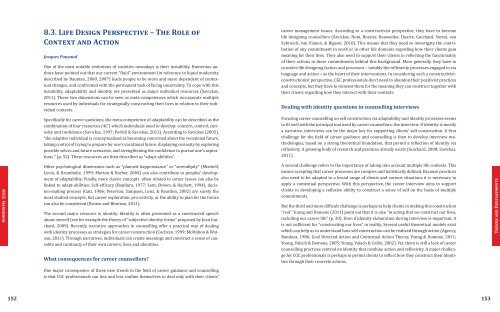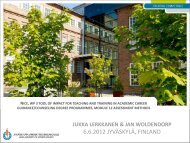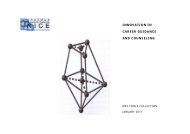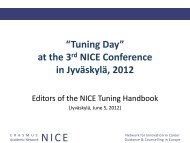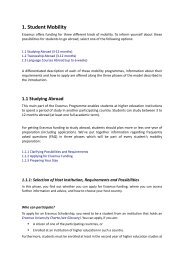8.3. Life Design Perspective – The Role <strong>of</strong>Context and ActionJacques PouyaudOne <strong>of</strong> the most notable evolutions <strong>of</strong> societies nowadays is their instability. Numerous authorshave pointed out that our current “fluid” environment (in reference to liquid modernitydescribed by Bauman, 2000, 2007) leads people to be more and more dependent <strong>of</strong> contextualchanges, and confronted with the permanent task <strong>of</strong> facing uncertainty. To cope with thisinstability, adaptability and identity are presented as major individual resources (Savickas,2011). These two dimensions can be seen as meta-competences which incorporate multipleresources used by individuals for strategically constructing their lives in relation to their individualcontexts.career management issues. According to a constructivist perspective, they have to becomelife designing counsellors (Savickas, Nota, Rossier, Dauwalder, Duarte, Guichard, Soresi, vanEsbroeck, van Vianen, & Bigeon, 2010). This means that they need to investigate the contribution<strong>of</strong> any commitment in work or in other life domains regarding how their clients gainmeaning for their lives. They also need to support their clients in reflecting the functionality<strong>of</strong> their actions in these commitments behind this background. More generally, they have toconsider life designing factors and processes – notably the reflexivity processes engaged in vialanguage and action – as the heart <strong>of</strong> their interventions. In considering such a constructivistconstructionistperspective, CGC pr<strong>of</strong>essionals don’t need to abandon their positivist practicesand concepts, but they have to reinvest them for the meaning they can construct together withtheir clients regarding how they interact with their contexts.Dealing with identity questions in counselling interviewsSpecifically for career questions, the meta-competence <strong>of</strong> adaptability can be described as thecombination <strong>of</strong> four resources (4C’) which individuals need to develop: concern, control, curiosityand confidence (Savickas, 1997; Porfeli & Savickas, 2012). According to Savickas (2005),“the adaptive individual is conceptualized as becoming concerned about the vocational future,taking control <strong>of</strong> trying to prepare for one‘s vocational future, displaying curiosity by exploringpossible selves and future scenarios, and strengthening the confidence to pursue one’s aspirations” (p. 52). These resources are then described as “adapt-abilities”.Focusing career counselling on self construction via adaptability and identity processes seemsto fit well with the principal tool used by career counsellors: the interview. If identity is mostlya narrative, interviews can be the major key for supporting clients’ self construction. A firstchallenge for the field <strong>of</strong> career guidance and counselling is then to develop interview methodologies,based on a strong theoretical foundation, that permit a reflection <strong>of</strong> identity viareflexivity. A growing body <strong>of</strong> research and practices already exists (Guichard, 2008; Savickas,2011).<strong>NICE</strong> HandbookOther psychological dimensions such as “planned happenstance” or “serendipity” (Mitchell,Levin, & Krumboltz, 1999; Merton & Barber, 2004) can also contribute to peoples’ development<strong>of</strong> adaptability. Finally, more classic concepts <strong>of</strong>ten related to career issues can also belinked to adapt-abilities: Self-efficacy (Bandura, 1977; Lent, Brown, & Hackett, 1994), decision-makingprocess (Gati, 1986; Peterson, Sampson, Lenz, & Reardon, 2002) are surely themost studied concepts, but career exploration, pro-activity, or the ability to plan for the futurecan also be considered (Brown and Bimrose, 2011).The second major resource is identity. Identity is <strong>of</strong>ten presented as a constructed speechabout oneself (see for example the theory <strong>of</strong> “subjective identity forms” proposed by Jean Guichard,2009). Recently, narrative approaches in counselling <strong>of</strong>fer a practical way <strong>of</strong> dealingwith identity processes as strategies for career construction (Cochran, 1999; McMahon & Watson,2011). Through narratives, individuals can create meanings and construct a sense <strong>of</strong> causalityand continuity <strong>of</strong> their own careers, lives and identities.What consequences for career counsellors?A second challenge refers to the importance <strong>of</strong> taking into account multiple life contexts. Thismeans accepting that career processes are complex and holistically defined. Because practicesalso need to be adapted to a broad range <strong>of</strong> clients and various situations it is necessary toapply a contextual perspective. With this perspective, the career interview aims to supportclients in developing a reflexive ability to construct a sense <strong>of</strong> self on the basis <strong>of</strong> multiplecommitments.But the third and more difficult challenge is perhaps to help clients in making this construction“real”. Young and Domene (2011) point out that it is also “in acting that we construct our lives,including our career life” (p. 30). Even if identity elaboration during interview is important, itis not sufficient for “constructing our lives” in reality. Several useful theoretical models existwhich can help us to understand how self construction can be realized through action (Agency,Bandura, 1986; Goal Directed Action and Contextual Action Theory, Young & Domene, 2011;Young, Valach & Domene, 2005; Young, Valach & Collin, 2002). Yet, there is still a lack <strong>of</strong> careercounselling practices centred on identity that combine action and reflexivity. A major challengefor CGC pr<strong>of</strong>essionals is perhaps to permit clients to reflect how they construct their identitiesthrough their concrete actions.Trends and DevelopmentsOne major consequence <strong>of</strong> these new trends in the field <strong>of</strong> career guidance and counsellingis that CGC pr<strong>of</strong>essionals can less and less confine themselves to deal only with their clients’152 153
CGC pr<strong>of</strong>essions need support in reflecting actual counselling practiceReferencesMajor consequences for the <strong>training</strong> <strong>of</strong> CGC pr<strong>of</strong>essionals concern the necessity <strong>of</strong> internshipsand practical <strong>training</strong> during higher education. Generally, practical activities help students todevelop tools for their interventions based on theories, but „doing“ (practice) isn‘t sufficient.Practice needs to be „reflective“, too. This means that the curricula <strong>of</strong> CGC degree programmesneed to place a high degree <strong>of</strong> importance on reflexivity. In order to train students in <strong>Career</strong>Counselling (Module C2), which focuses on enhancing clients’ reflexivity, curricula should include<strong>training</strong> in the use <strong>of</strong> specific tools centred on these theoretical perspectives (see belowfor example the System <strong>of</strong> Activities Inventory, or the career counselling interview model inChapter 8.11.1), but also permit counsellors to get pr<strong>of</strong>essional feedbacks on their practice.During their <strong>training</strong> years, future CGC pr<strong>of</strong>essionals need to have the opportunity to experiencethe complexity <strong>of</strong> real contexts and the difficulty applying holistic counselling approaches.They also need to be assisted in the analysis <strong>of</strong> their practice sessions in order to developtheir career counselling competence.Bandura, A. (1977): Social Learning Theory, Englewood Cliffs, New-York: Prentice-HallBauman, Z. (2000): Liquid modernity. Cambridge, UK: Polity PressBauman, Z. (2007): Liquid Times: Living in an age <strong>of</strong> uncertainty. Cambridge, UK: Polity PressBrown, A. & Bimrose, J. (2011): The role <strong>of</strong> career adaptability in facilitating individual career development. Paper presentedat the International Conference Vocational Designing and <strong>Career</strong> Counselling. Challenges and New Horizons,Padova, 12-14 SeptemberCochran, L. (1997): <strong>Career</strong> counselling: A narrative approach. Thousand Oaks, CA: SageCurie, J., Hajjar, V., Marquie, H., & Roques, M. (1990): Proposition méthodologique pour la description du système desactivités. Le Travail Humain, 53, 103–118Gati, I. (1986): Making career decisions: A sequential elimination approach. Journal <strong>of</strong> Counselling Psychology, 33,408-417Guichard, J. (2009): Self –constructing. Journal <strong>of</strong> vocational behavior, 75, 251-258Guichard, J. (2008): Proposition d’un schéma d’entretien constructiviste de conseil en orientation (life designing counselling)pour les adolescents et j<strong>eu</strong>nes adultes. L’Orientation Scolaire et Pr<strong>of</strong>essionnelle, 37, 413-441Lent, R. W., Brown, S. D., Hackett, G. (1994): Towards a unifying social cognitive theory <strong>of</strong> career and academic interest,choice and performance. Journal <strong>of</strong> Vocational Behavior, 45, 79-122<strong>NICE</strong> HandbookExample <strong>of</strong> Innovative PracticeThe System <strong>of</strong> Activities Inventory (ISA, Curie et al, 1990) can serveas an illustration <strong>of</strong> a constructivist practice centred on life designing, combinedwith a narrative reflection <strong>of</strong> actions. This tool is based on the System <strong>of</strong>Activities Model (Curie et al, 1990) which allows clarifying the meaning that individualsgive to their different activities and life projects, organised in a dynamic system.The interview aims to help clients to:◆◆◆◆◆◆Elaborate a representation <strong>of</strong> their investments in various life rolesIdentify their priorities, main values according to various experiences and significantlife projectsIdentify relationship between different life domains (family, work, social andpersonal activities)ISA is a structured interview based on exercises <strong>of</strong> sorting cards. The way people classifycards, allows a quantitative assessment <strong>of</strong> how important different spheres <strong>of</strong> life are forclients, and how they relate to each other. This organisation is then discussed/ evaluatedwith clients in order to support them in making new commitments (or strengtheningexisting ones).One limit <strong>of</strong> this tool is that it is mainly supported by language as reflexivity’s medium.To be effective, self construction needs to be supported holistically by also focussingon behaviours, feelings, emotions and physical repercussions. It is recommendedto use the ISA in combination with counselling practices which alsolook into these factors.McMahon, M., & Watson, M. (eds) (2011): <strong>Career</strong> counselling and constructivism: Elaboration <strong>of</strong> constructs. New-York:Nova Science PublishersMerton, R. K., Barber, E. (2004): The Travels and Adventures <strong>of</strong> Serendipity: A Study in Sociological Semantics and theSociology <strong>of</strong> Science, Princeton: Princeton University PressMitchell, K. E., Levin, A. S. & Krumboltz, J. D. (1999): Planned Happenstance: Constructing Unexpected <strong>Career</strong> Opportunities.Journal <strong>of</strong> Counselling and Development, 77, 115-124Peterson, G. W., Sampson, J. P., Jr., Lenz, J. G., & Reardon, R. C. (2002): Becoming career problem solvers and decisionmakers: A cognitive information processing approach. In D. Brown (Ed.): <strong>Career</strong> choice and development (pp. 312-369) (4th. Ed.). San Francisco, CA: Jossey-BassPorfeli, E.J., & Savickas, M.L. (2012): <strong>Career</strong> Adapt-Abilities Scale-USA Form: Psychometric properties and relation tovocational identity. Journal <strong>of</strong> Vocational Behavior, doi:10.1016/j.jvb.2012.01.009Savickas, M. (2011): <strong>Career</strong> counselling. Washington: American Psychological AssociationSavickas, ML (2005): The theory and practice <strong>of</strong> career construction. In SD Brown & RW Lent (Eds.), <strong>Career</strong> developmentand counseling: Putting Theory and Research to Work (42−70). Hoboken, NJ: WileySavickas, M. L. (1997): <strong>Career</strong> adaptability: An integrative construct for life-span, life-space theory. <strong>Career</strong> DevelopmentQuarterly, 45, 247–259Savickas, M. L., Nota, L., Rossier, J., Dauwalder, J. P., Duarte, M. E., Guichard, J., Soresi, S. Van Esbroeck, R., Vianen, A. E.M. (2009): Life designing: A paradigm for career construction in the 21st century. Journal <strong>of</strong> Vocational Behavior, 75,239–250Young, R.A., & Domene, J. F. (2011): The construction <strong>of</strong> agency in career counselling. In M. McMahon & M. Watson(Eds.): <strong>Career</strong> counselling and constructivism: Elaboration <strong>of</strong> constructs (pp. 25-38). New-York: Nova Science PublishersYoung, R.A., Valach, L. & Collin, A. (2002): A contextual explanation <strong>of</strong> career. In D. Brown & Associates (Eds), <strong>Career</strong>choice and development (4th ed., pp. 477-512). San Francisco, CA: Jossey-BassYoung, R.A., Valach, L. & Domene, J. F. (2005): The action project method in counselling psychology. Journal <strong>of</strong> CounsellingPsychology, 52, 215-223Trends and Developments154 155


